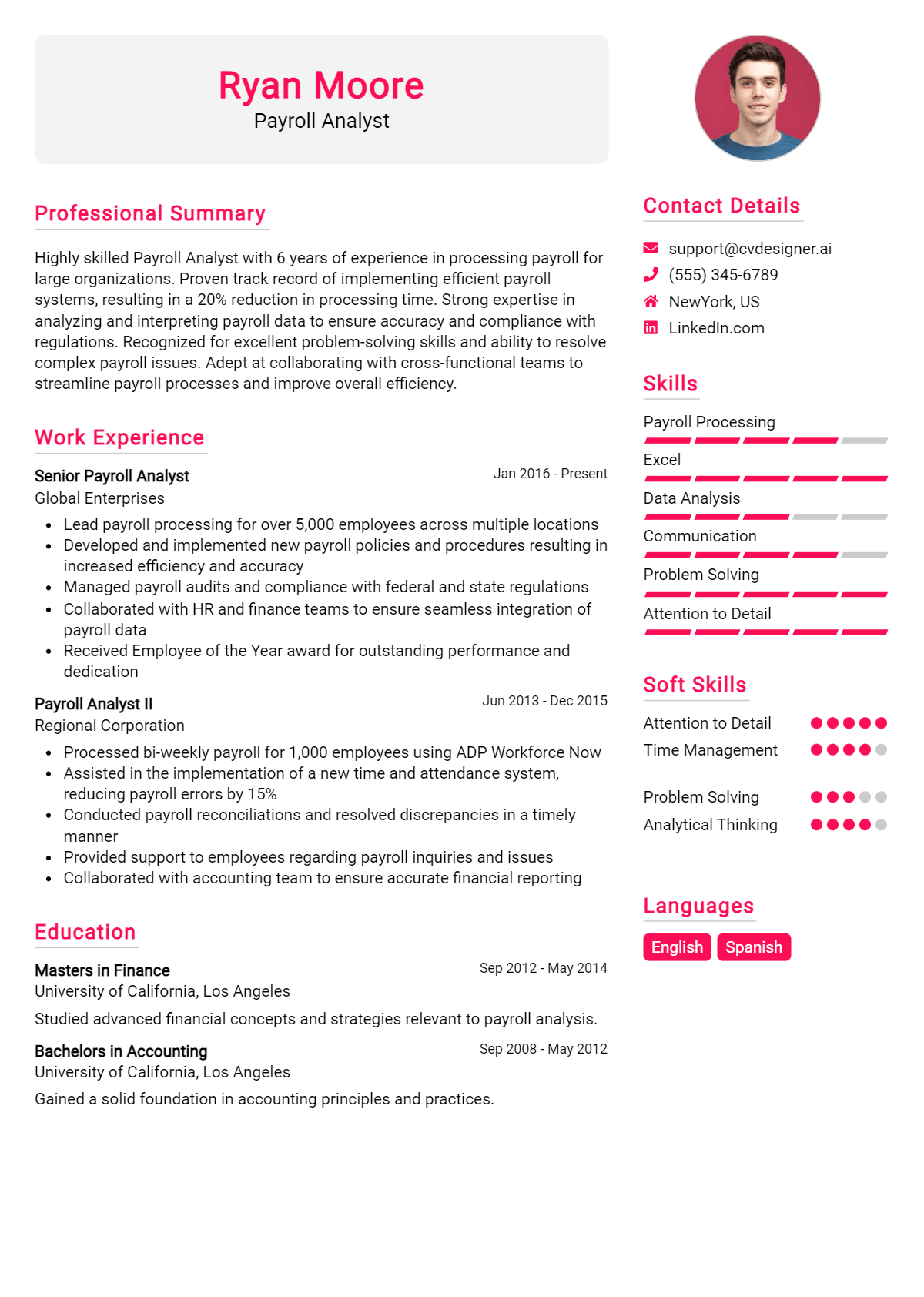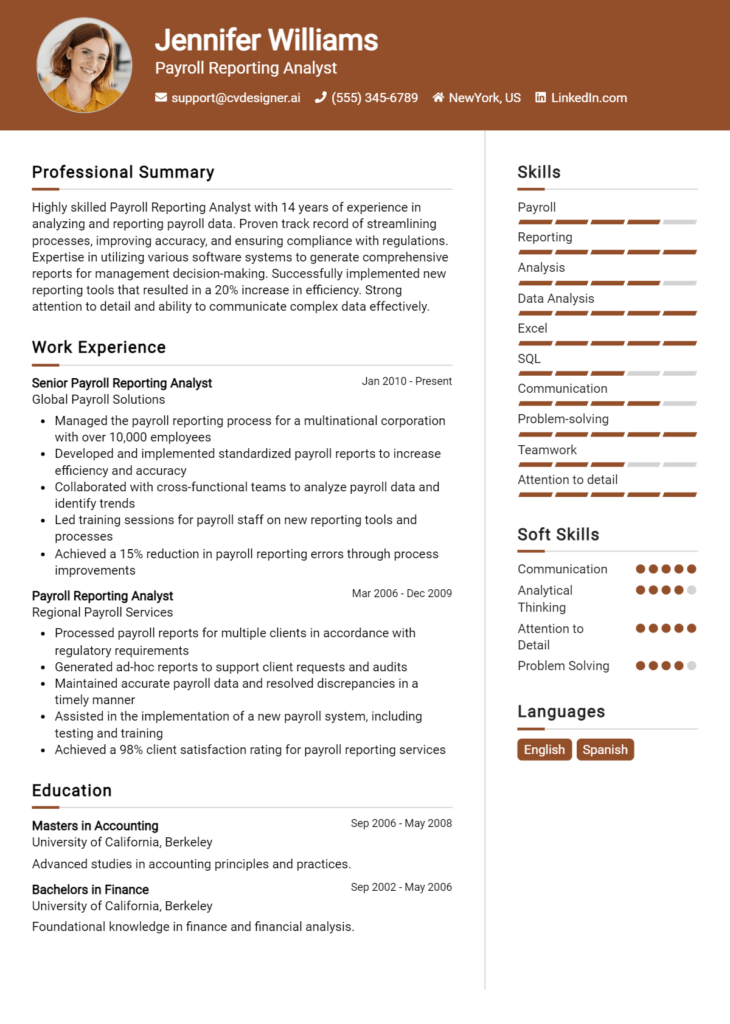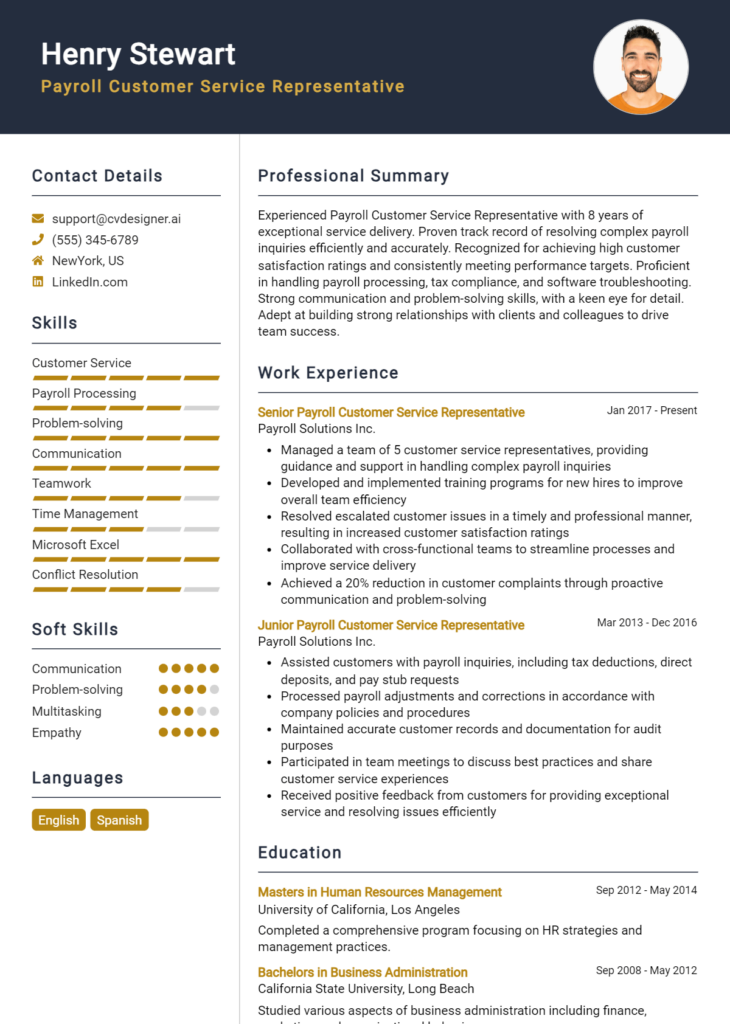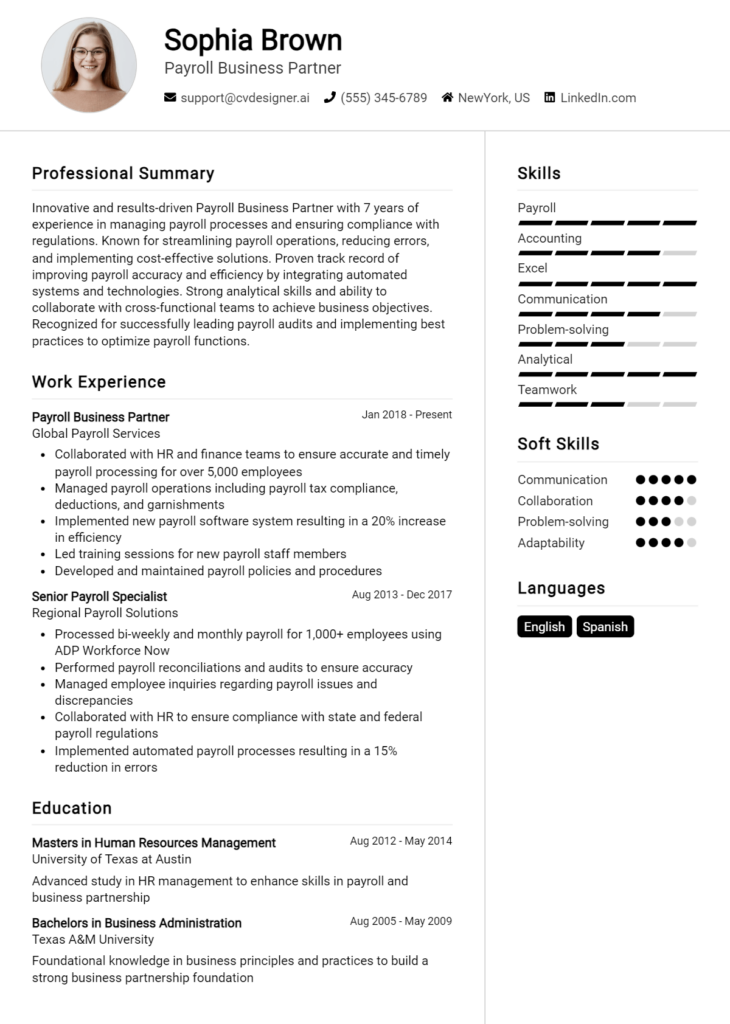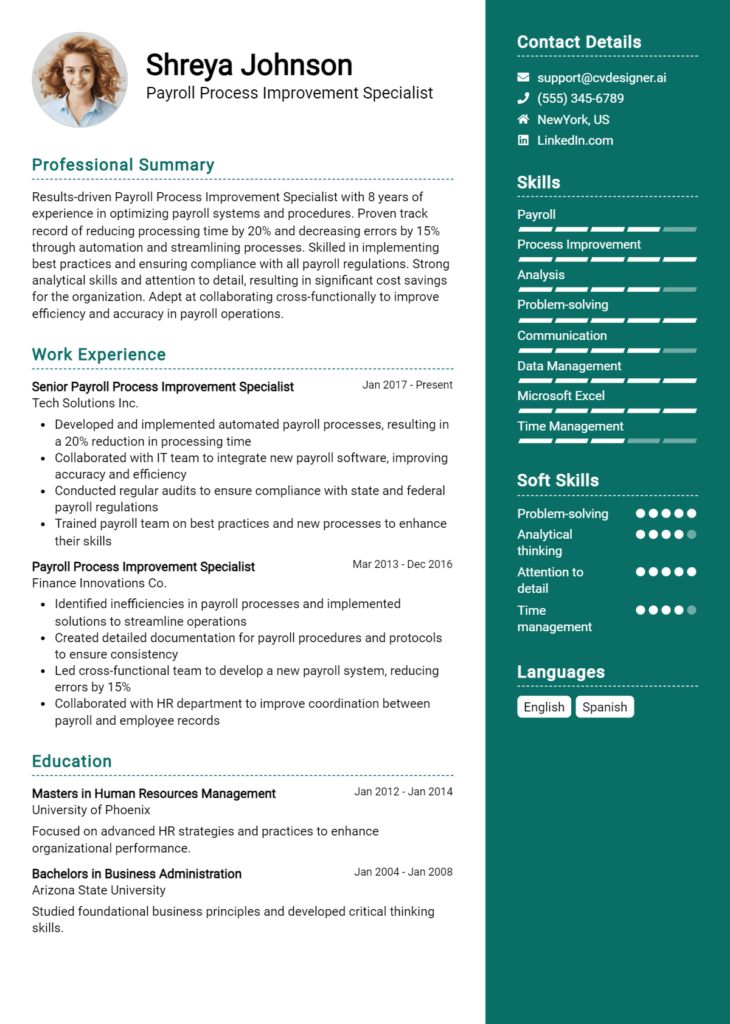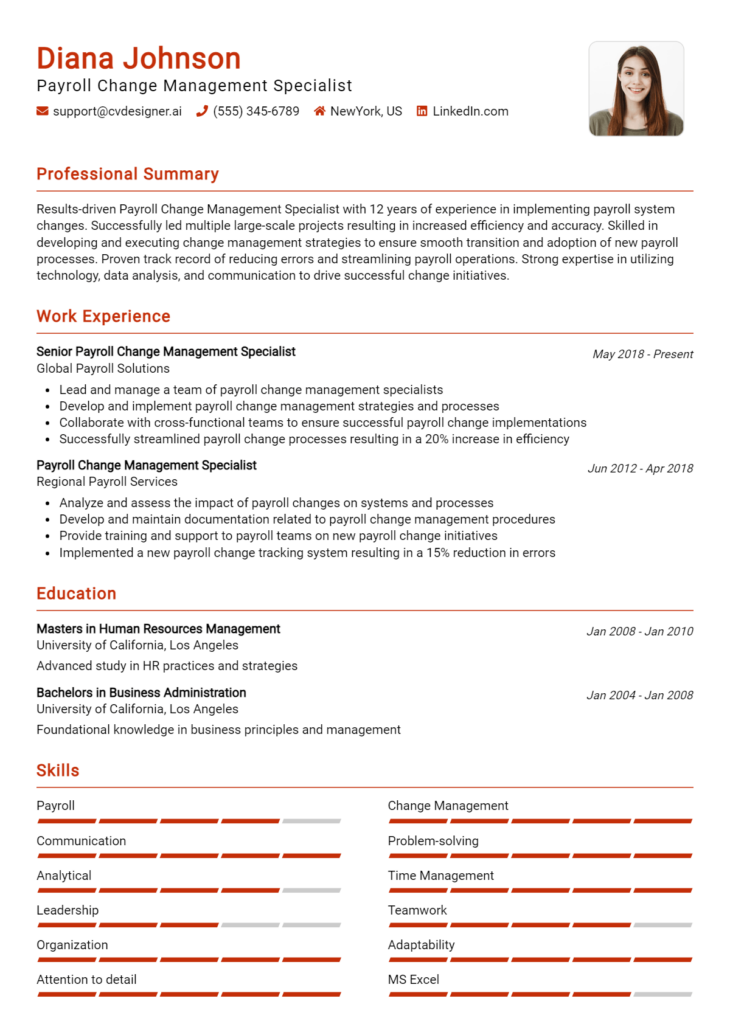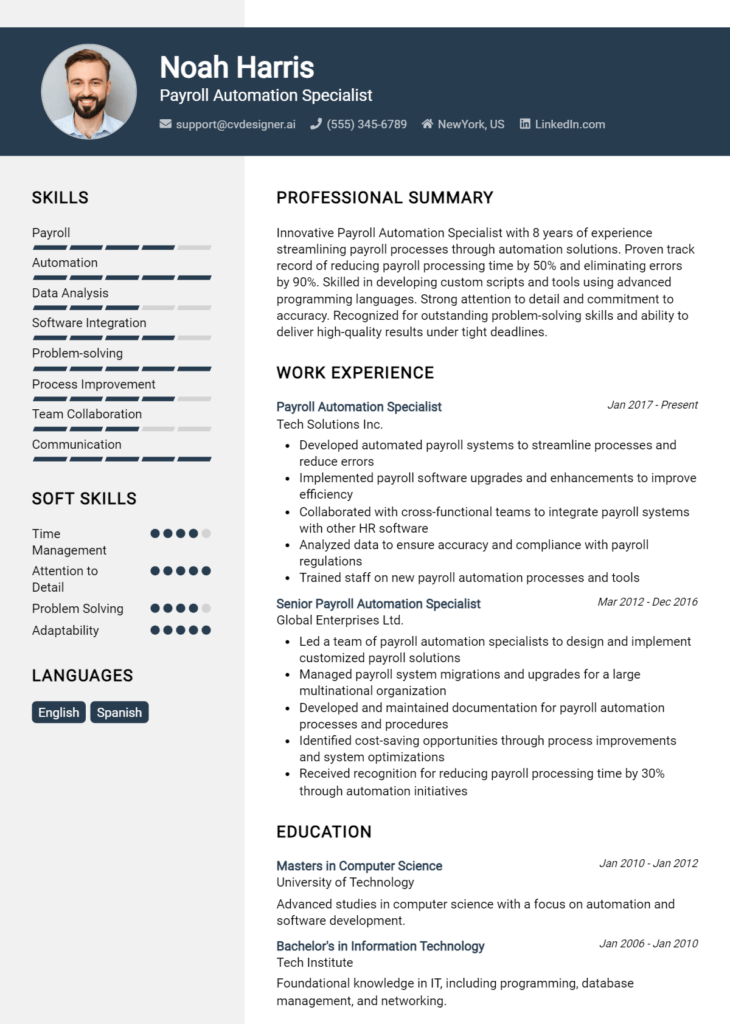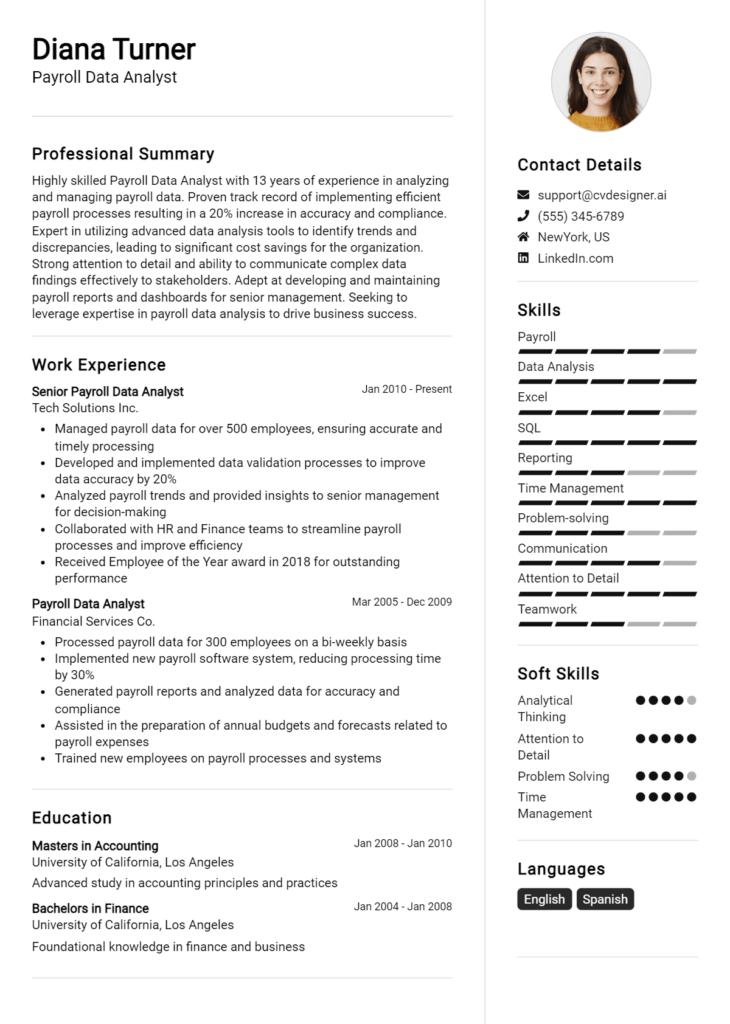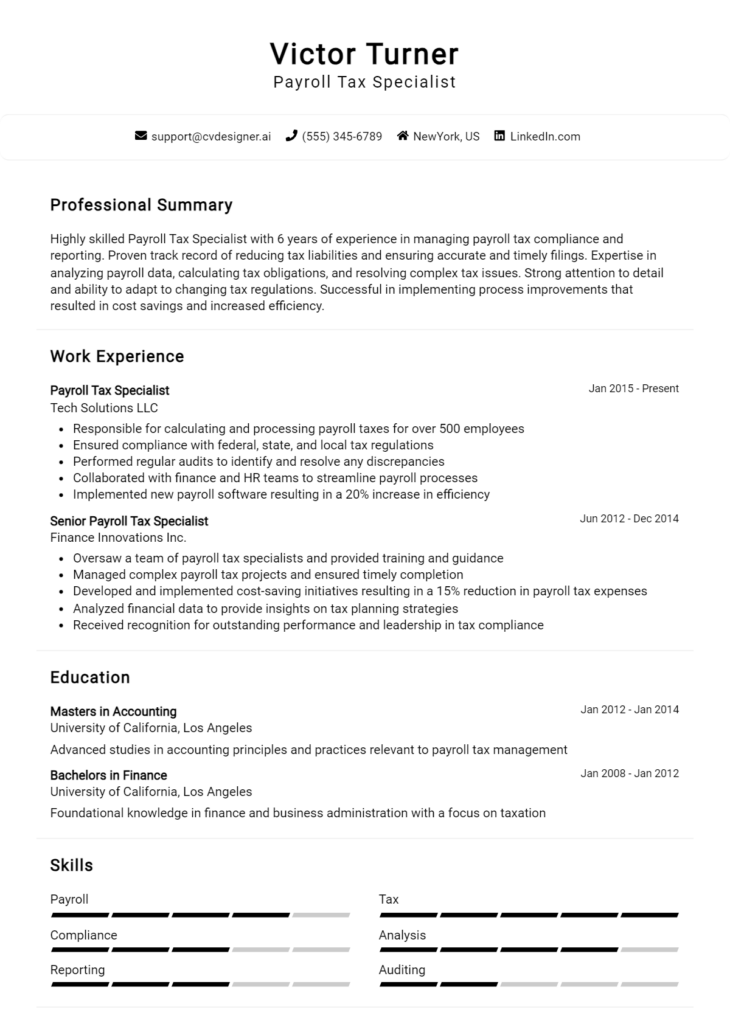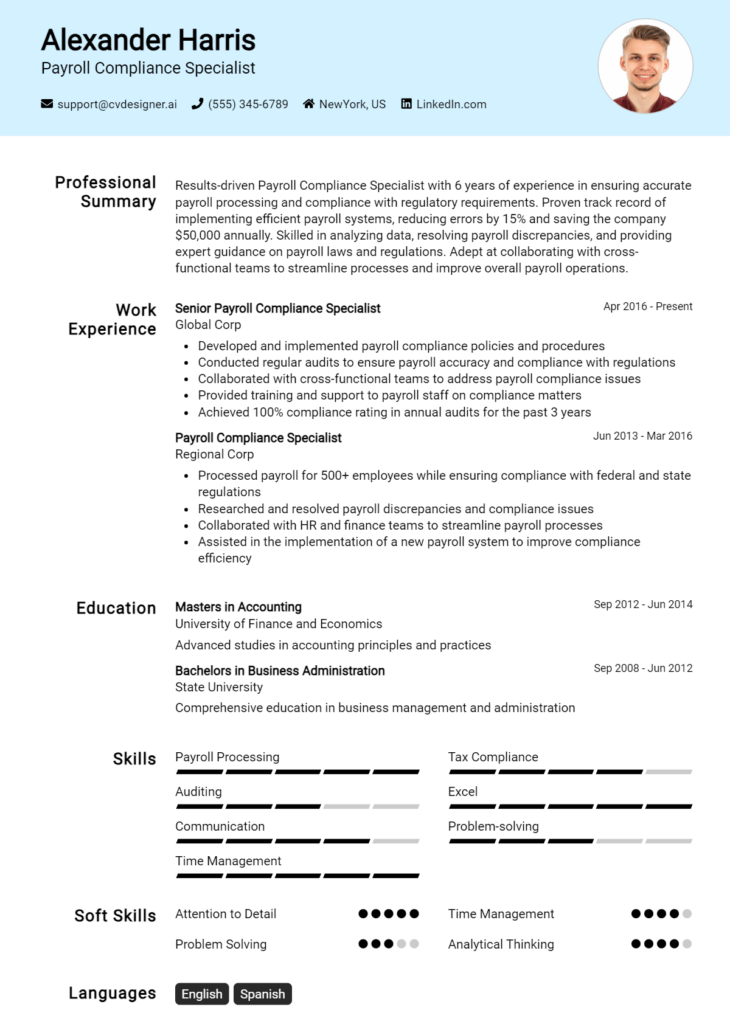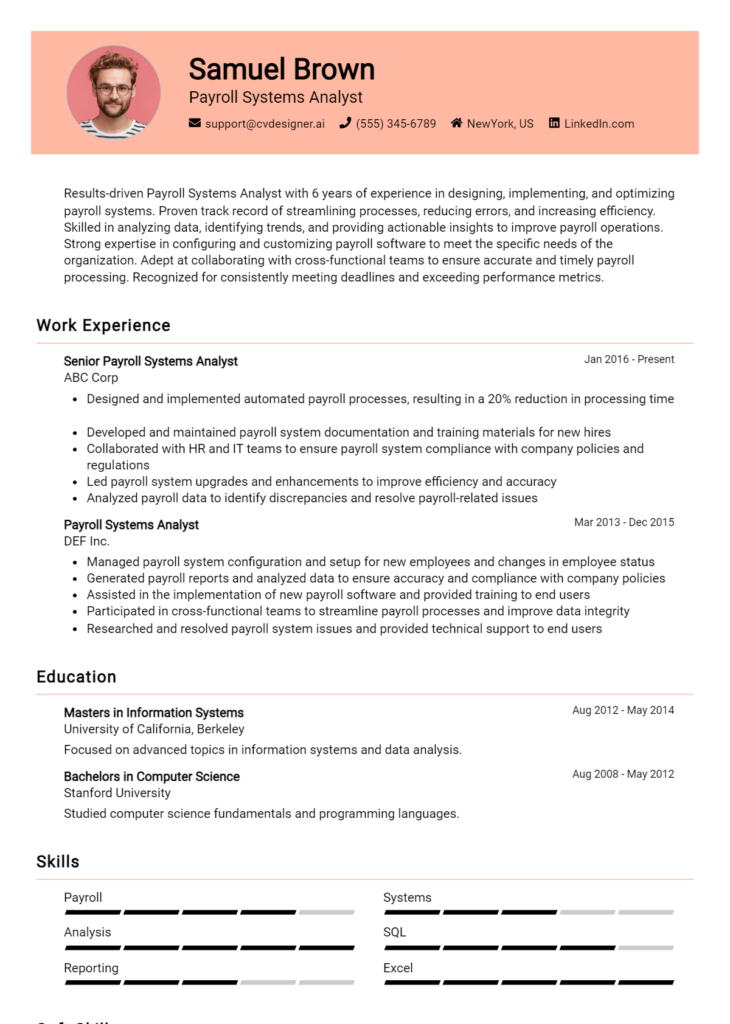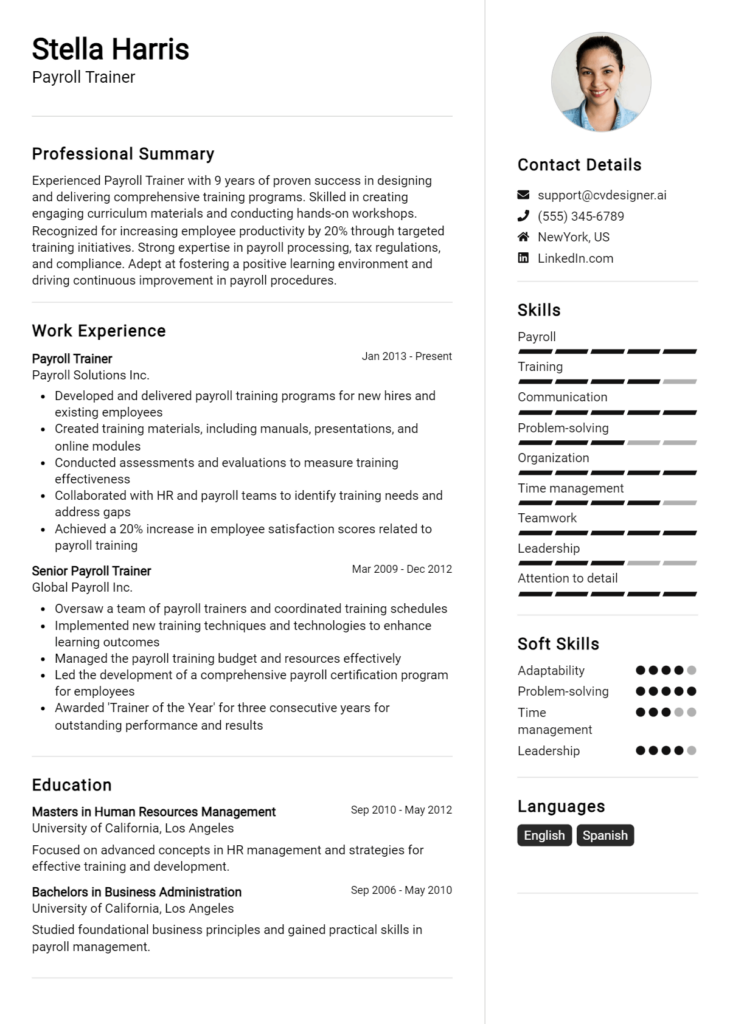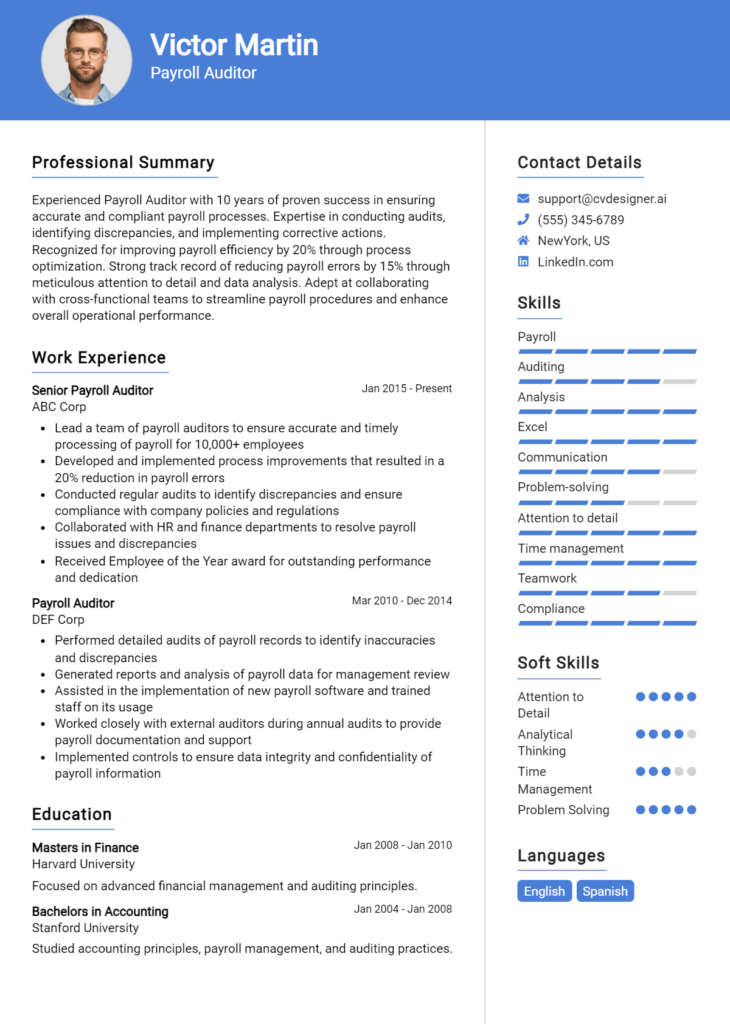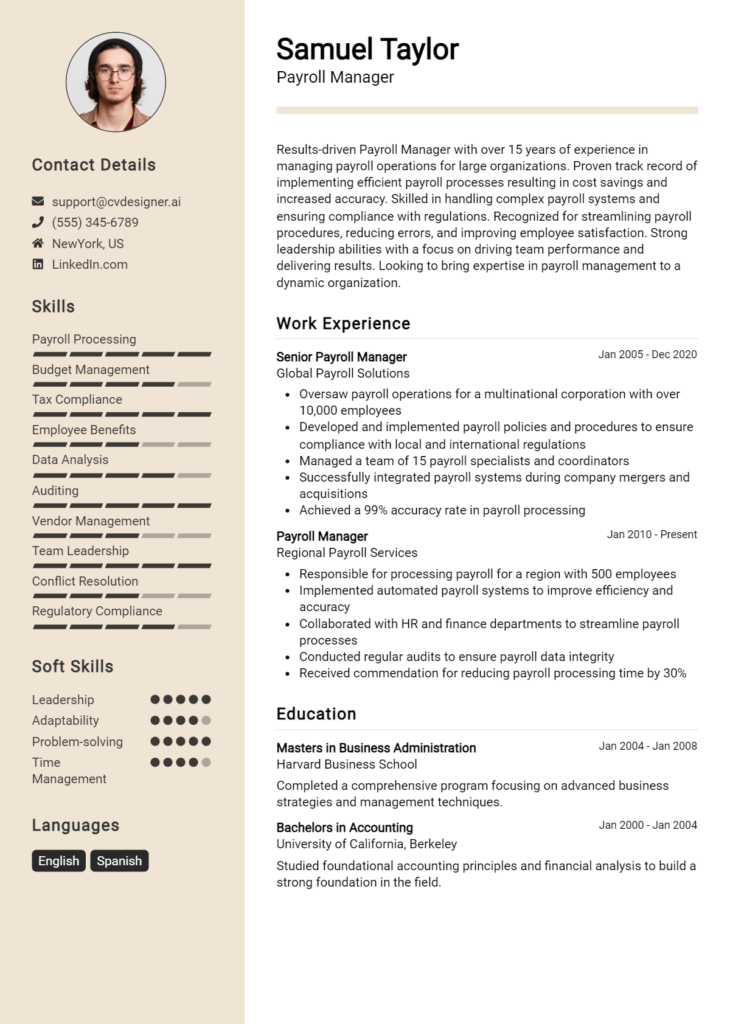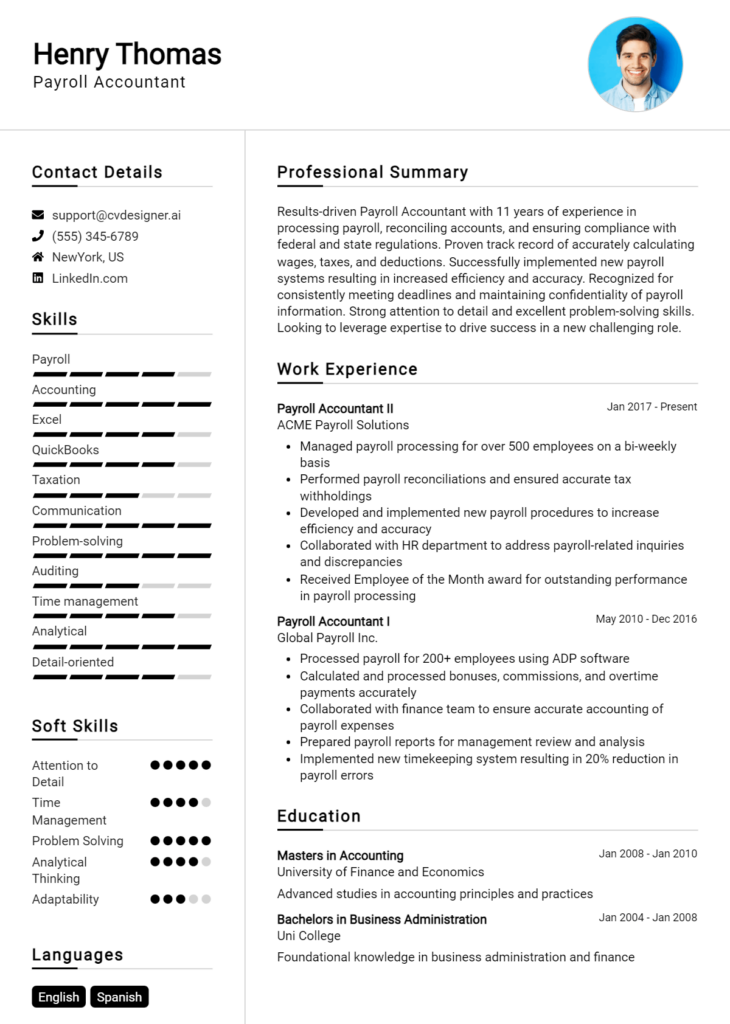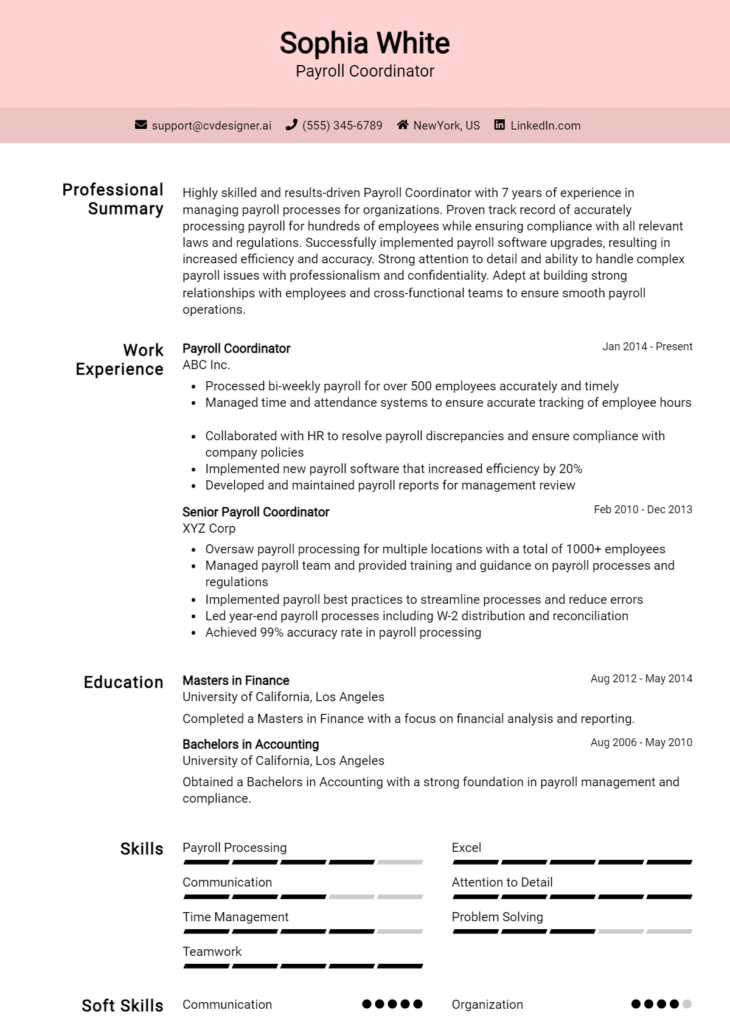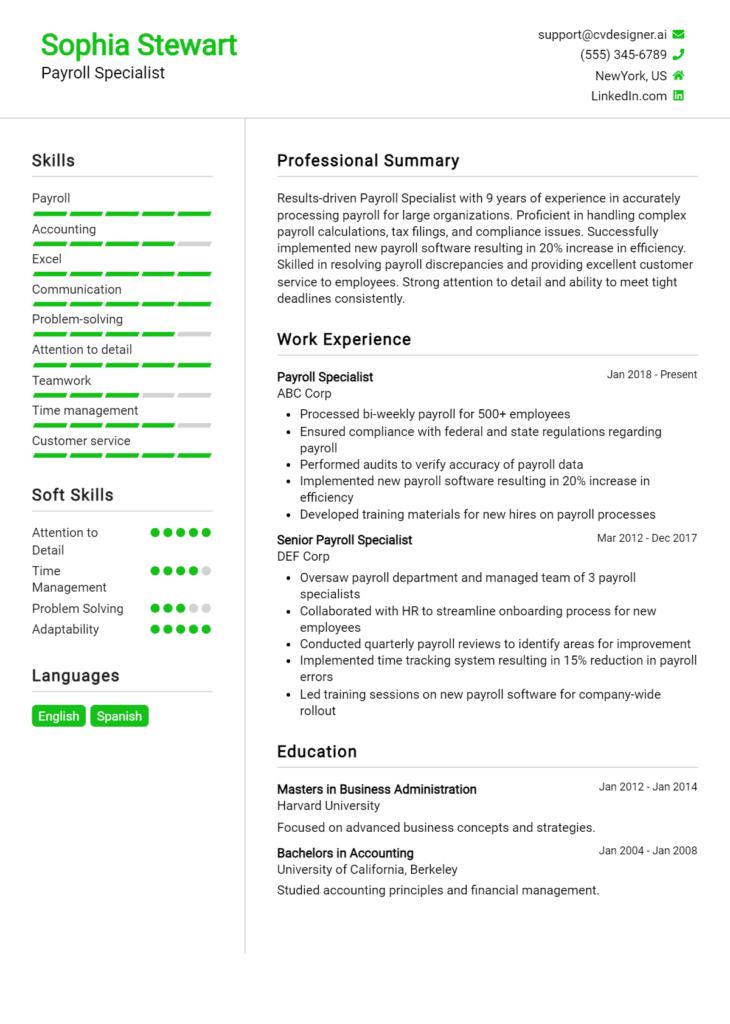Payroll Analyst Core Responsibilities
A Payroll Analyst plays a crucial role in managing and processing employee compensation, ensuring accuracy and compliance with regulations. Key responsibilities include analyzing payroll data, reconciling discrepancies, and collaborating with HR and finance departments to streamline operations. Strong technical skills in payroll systems, operational acumen, and problem-solving abilities are essential for success. These skills contribute significantly to the organization’s goals by enhancing efficiency and accuracy. A well-structured resume can effectively highlight these qualifications, making a candidate stand out.
Common Responsibilities Listed on Payroll Analyst Resume
- Process bi-weekly and monthly payroll for employees.
- Ensure compliance with federal, state, and local payroll laws.
- Reconcile payroll discrepancies and resolve issues promptly.
- Maintain accurate payroll records and employee information.
- Assist in the preparation of payroll reports and analyses.
- Collaborate with HR to manage employee benefits and deductions.
- Implement and enhance payroll policies and procedures.
- Conduct audits to ensure accuracy of payroll data.
- Provide support during internal and external payroll audits.
- Stay updated on payroll regulations and best practices.
- Train and support staff on payroll processes and systems.
High-Level Resume Tips for Payroll Analyst Professionals
In today's competitive job market, a well-crafted resume serves as a vital tool for Payroll Analyst professionals, acting as the first impression on potential employers. This document is not just a list of past jobs; it needs to reflect a candidate’s unique skills, relevant experience, and significant achievements in the field of payroll management. Given the complexities and responsibilities that come with this role, a strong resume can set you apart from the competition and help you secure an interview. In this guide, we’ll provide practical and actionable tips specifically tailored for Payroll Analyst professionals to enhance their resumes and improve their chances of landing that coveted position.
Top Resume Tips for Payroll Analyst Professionals
- Tailor your resume to the job description by incorporating keywords and phrases that align with the specific role you are applying for.
- Showcase relevant experience by highlighting specific payroll processes you have managed, such as payroll calculations, tax filings, and compliance audits.
- Quantify your achievements by providing metrics that demonstrate your impact, such as percentage reductions in payroll processing time or error rates.
- Highlight industry-specific skills, including proficiency in payroll software (e.g., ADP, Paychex) and familiarity with relevant laws and regulations.
- Include a summary statement at the top of your resume that encapsulates your career highlights and core competencies in payroll analysis.
- Utilize bullet points for clarity and conciseness, making it easy for hiring managers to quickly scan your qualifications.
- Demonstrate your analytical skills by mentioning any experience with payroll data analysis and reporting.
- Incorporate any relevant certifications, such as Certified Payroll Professional (CPP), to further validate your expertise.
- Keep your resume to one page, particularly if you have less than 10 years of experience, to ensure it remains focused and impactful.
- Proofread thoroughly to eliminate any errors in spelling or grammar, as accuracy is crucial in the payroll field.
By implementing these tips, Payroll Analyst professionals can significantly enhance their resumes, making them more compelling and relevant to potential employers. A polished resume that effectively showcases your skills and achievements will not only increase your chances of landing an interview but also help you present yourself as a qualified candidate in the ever-evolving field of payroll management.
Why Resume Headlines & Titles are Important for Payroll Analyst
In the competitive job market for Payroll Analysts, a well-crafted resume headline or title serves as a crucial first impression that can set the tone for the entire application. A strong headline captures the attention of hiring managers and succinctly summarizes a candidate's key qualifications, making it easier for them to identify the most suitable applicants. By presenting a concise and relevant title that directly reflects the job being applied for, candidates can enhance their visibility and increase their chances of making a memorable impact right from the start.
Best Practices for Crafting Resume Headlines for Payroll Analyst
- Keep it concise: Aim for one impactful phrase that encapsulates your expertise.
- Be role-specific: Tailor your headline to reflect the specific responsibilities of a Payroll Analyst.
- Highlight key skills: Incorporate relevant skills that stand out in the payroll and finance domain.
- Use industry keywords: Include terminology that is commonly recognized in payroll analysis to enhance credibility.
- Showcase experience: If applicable, mention years of experience or specific accomplishments in the field.
- Avoid jargon: Ensure clarity by avoiding overly technical language that may confuse hiring managers.
- Focus on value: Convey what you can bring to the role rather than just stating your job title.
- Make it actionable: Use strong verbs to portray your capabilities and contributions effectively.
Example Resume Headlines for Payroll Analyst
Strong Resume Headlines
Detail-Oriented Payroll Analyst with 5+ Years of Experience in Multi-State Payroll Management
Certified Payroll Professional Specializing in Compliance and Process Improvement
Results-Driven Payroll Analyst with Proven Track Record in Reducing Payroll Errors by 30%
Weak Resume Headlines
Payroll Analyst
Experienced Professional Looking for a Job
The strong resume headlines are effective because they are specific, highlight relevant skills and achievements, and immediately inform hiring managers about the candidate's qualifications. They create a clear image of what the candidate can offer, making them more likely to be remembered. In contrast, the weak resume headlines lack detail and uniqueness, failing to capture attention or convey any significant value, which can lead to candidates being overlooked in a crowded job market.
Writing an Exceptional Payroll Analyst Resume Summary
A well-crafted resume summary is essential for a Payroll Analyst as it serves as a powerful introduction that quickly captures the attention of hiring managers. In a competitive job market, a strong summary highlights key skills, relevant experience, and notable accomplishments, allowing candidates to stand out from the crowd. This brief yet impactful section should be concise, ideally 2-4 sentences, and tailored specifically to the job the candidate is applying for, ensuring it resonates with the hiring team and aligns with their needs.
Best Practices for Writing a Payroll Analyst Resume Summary
- Quantify achievements: Use numbers and percentages to demonstrate your impact, such as accuracy rates or cost savings.
- Focus on relevant skills: Highlight key payroll-related skills such as compliance knowledge, software proficiency, and analytical abilities.
- Tailor the summary: Customize your summary to match the specific job description and requirements of the position.
- Showcase experience: Mention years of experience and any particular industries you've worked in that relate to the role.
- Highlight accomplishments: Include notable achievements, such as successful audits or improvements in payroll processing time.
- Keep it concise: Aim for clarity and brevity, ensuring you communicate your value proposition quickly.
- Use action verbs: Start sentences with strong action verbs to convey a sense of proactivity and results-oriented performance.
- Maintain professionalism: Use a formal tone and avoid jargon or overly casual language.
Example Payroll Analyst Resume Summaries
Strong Resume Summaries
Detail-oriented Payroll Analyst with over 5 years of experience managing payroll for 500+ employees, achieving a 99% accuracy rate and reducing processing time by 30%. Proficient in ADP and Oracle, with a strong background in compliance and taxation.
Results-driven Payroll Analyst with a proven track record of implementing payroll solutions that improved efficiency by 25%. Expertise in payroll legislation and auditing processes, contributing to a 15% reduction in payroll discrepancies over two years.
Dedicated Payroll Analyst skilled in data analysis and reporting, having processed payroll for diverse industries. Successfully led a project to automate payroll systems, resulting in a 40% decrease in administrative workload and enhanced employee satisfaction.
Weak Resume Summaries
Experienced payroll professional looking for new opportunities in payroll management.
Payroll Analyst with some experience in handling payroll tasks and a basic understanding of payroll systems.
The strong resume summaries are considered effective because they provide specific details about the candidate's experience, quantify their achievements, and demonstrate direct relevance to the Payroll Analyst role. They are tailored to highlight the skills and impact that align with what hiring managers seek. In contrast, the weak summaries lack specificity, measurable outcomes, and do not convey a clear value proposition, making them less compelling to potential employers.
Work Experience Section for Payroll Analyst Resume
The work experience section of a Payroll Analyst resume is pivotal as it serves as a direct reflection of the candidate's technical skills, leadership capabilities, and the ability to deliver high-quality payroll products consistently. This section not only highlights the practical application of payroll systems and compliance but also underscores the candidate's experience in managing teams and improving processes. Quantifying achievements—such as cost savings, efficiency improvements, and compliance rates—and aligning experiences with industry standards ensure that potential employers can see the tangible contributions the candidate can make to their organization.
Best Practices for Payroll Analyst Work Experience
- Detail technical skills: Clearly outline proficiency in payroll software, data analysis, and reporting tools.
- Quantify achievements: Use numbers and percentages to showcase improvements, such as reducing payroll processing time or increasing accuracy rates.
- Showcase collaboration: Highlight experiences where teamwork led to enhanced payroll functions or project success.
- Align with industry standards: Use terminology and frameworks familiar to payroll professionals to demonstrate industry knowledge.
- Focus on problem-solving: Include examples where you identified issues and implemented effective solutions.
- Include certifications: Mention relevant certifications that demonstrate commitment to professional development and expertise.
- Use action verbs: Start bullet points with strong action verbs to convey impact and initiative.
- Customize for the role: Tailor your experiences to match the specific requirements and responsibilities of the job you are applying for.
Example Work Experiences for Payroll Analyst
Strong Experiences
- Implemented a new payroll software system that reduced processing time by 30%, resulting in annual savings of $50,000.
- Led a team of 5 in a project to audit payroll practices, achieving a 95% compliance rate with federal regulations.
- Developed training materials for new hires, improving team efficiency and onboarding time by 40%.
- Collaborated with HR to streamline the payroll process, enhancing employee satisfaction scores by 20% within one year.
Weak Experiences
- Responsible for payroll processing.
- Worked with the team to complete payroll tasks.
- Ensured payroll accuracy.
- Performed various payroll-related duties.
The examples categorized as strong are impactful because they provide specific, quantifiable results and demonstrate leadership and collaboration in achieving measurable outcomes. In contrast, the weak experiences lack detail and specificity, making it difficult for potential employers to gauge the candidate's contributions and effectiveness in their previous roles.
Education and Certifications Section for Payroll Analyst Resume
The education and certifications section of a Payroll Analyst resume plays a crucial role in demonstrating the candidate's academic credentials and industry-specific qualifications. This section provides potential employers with insight into the candidate's foundational knowledge, relevant skills, and commitment to professional development. By including pertinent coursework, recognized certifications, and specialized training, candidates can significantly enhance their credibility and better align themselves with the job requirements, showcasing their readiness to excel in the Payroll Analyst role.
Best Practices for Payroll Analyst Education and Certifications
- Include relevant degrees such as a Bachelor's in Accounting, Finance, or Business Administration.
- List industry-recognized certifications like the Certified Payroll Professional (CPP) or Fundamental Payroll Certification (FPC).
- Highlight relevant coursework that directly pertains to payroll processing, tax compliance, and labor laws.
- Detail any specialized training in payroll software or systems commonly used in the industry.
- Keep the information current by updating certifications and coursework to reflect ongoing education.
- Tailor the education section to match the specific requirements of the job description.
- Use clear formatting to ensure readability and emphasize important credentials.
- Avoid listing degrees or certifications that are not directly relevant to the Payroll Analyst role.
Example Education and Certifications for Payroll Analyst
Strong Examples
- Bachelor of Science in Accounting, XYZ University, Graduated May 2022
- Certified Payroll Professional (CPP), National Payroll Association, 2023
- Coursework in Payroll Management, Taxation, and Employment Law, XYZ University
- Advanced Training in ADP Payroll Software, Completed 2023
Weak Examples
- Associate Degree in General Studies, ABC Community College, 2019
- Certification in Microsoft Office, 2020
- Coursework in Graphic Design, DEF Institute
- High School Diploma, GHI High School, 2018
The strong examples provided illustrate relevant educational background and certifications that directly align with the responsibilities of a Payroll Analyst, showcasing both academic knowledge and specialized skills in the field. In contrast, the weak examples reflect outdated or unrelated qualifications that do not contribute to the candidate's capabilities in payroll processing, thereby diminishing their appeal to potential employers.
Top Skills & Keywords for Payroll Analyst Resume
As a Payroll Analyst, possessing the right blend of skills is crucial for effectively managing payroll processes and ensuring compliance with regulations. A well-crafted resume that highlights both hard and soft skills can significantly improve your chances of landing an interview. Employers seek candidates who not only have a strong technical foundation but also possess interpersonal abilities that enhance teamwork and communication. By showcasing your skills in your resume, you not only demonstrate your qualifications but also your understanding of the multifaceted nature of the role. For more insights on how to effectively present your skills, you can explore the skills section.
Top Hard & Soft Skills for Payroll Analyst
Soft Skills
- Attention to Detail
- Problem-Solving
- Communication Skills
- Time Management
- Adaptability
- Team Collaboration
- Confidentiality
- Analytical Thinking
- Customer Service Orientation
- Interpersonal Skills
- Organization Skills
- Critical Thinking
Hard Skills
- Proficiency in Payroll Software (e.g., ADP, Paychex)
- Knowledge of Payroll Regulations and Compliance
- Data Analysis and Reporting
- Microsoft Excel (Advanced Functions)
- Tax Calculation and Reporting
- Payroll Reconciliation
- General Ledger Accounting
- Familiarity with HRIS Systems
- Wage and Hour Laws
- Financial Reporting
- Data Entry Accuracy
- Process Improvement Techniques
A well-rounded skill set is essential for a Payroll Analyst, bridging the gap between technical expertise and soft skills. To ensure your resume stands out, make sure to highlight your relevant work experience and the skills that align with the job description.
Stand Out with a Winning Payroll Analyst Cover Letter
Dear Hiring Manager,
I am excited to apply for the Payroll Analyst position at [Company Name], as advertised on [where you found the job listing]. With a solid background in payroll processing and a keen eye for detail, I am confident in my ability to contribute effectively to your team. My experience in managing payroll systems, coupled with my analytical skills, allows me to ensure accuracy and compliance in all payroll activities, which I understand is crucial for maintaining employee satisfaction and organizational integrity.
In my previous role at [Previous Company Name], I successfully streamlined the payroll process by implementing new software that reduced processing time by 30%. I also took the initiative to conduct regular audits, which helped identify discrepancies and improved overall accuracy. My strong understanding of payroll regulations, tax compliance, and benefits administration has enabled me to handle complex payroll scenarios efficiently. Moreover, my proficiency in using Excel and various payroll software has equipped me to generate insightful reports that aid in strategic decision-making.
I am particularly drawn to [Company Name] because of its commitment to employee well-being and its innovative approaches to payroll management. I am eager to bring my expertise in payroll analysis to your team and help enhance the efficiency and effectiveness of your payroll operations. I thrive in collaborative environments and am always looking for ways to improve processes and drive results. I am looking forward to the opportunity to discuss how my background, skills, and enthusiasms align with the goals of [Company Name].
Thank you for considering my application. I look forward to the possibility of contributing to your team and am excited about the opportunity to work with a forward-thinking company like [Company Name]. Please feel free to contact me at [your phone number] or [your email address] to schedule a discussion.
Sincerely,
[Your Name]
Common Mistakes to Avoid in a Payroll Analyst Resume
When crafting a resume for a Payroll Analyst position, it is crucial to present a professional and detailed account of your skills and experiences. However, many candidates make common mistakes that can hinder their chances of landing an interview. By avoiding these pitfalls, you can create a compelling resume that highlights your qualifications and showcases your expertise in payroll processes. Here are some common mistakes to avoid:
Neglecting Relevant Experience: Failing to highlight specific payroll-related tasks or responsibilities can make your resume less relevant. Ensure you emphasize experiences directly tied to payroll management, tax calculations, and compliance.
Using Vague Language: Phrases like "responsible for" or "assisted with" do not convey your level of involvement. Use action verbs and quantify your achievements to demonstrate your impact in previous roles.
Ignoring Keywords: Many companies use Applicant Tracking Systems (ATS) to filter resumes. Not incorporating relevant keywords from the job description can result in your resume being overlooked. Tailor your resume for each application by aligning it with the job posting.
Listing Duties Instead of Achievements: Simply listing job duties does not effectively showcase your capabilities. Focus on specific accomplishments, such as improving payroll accuracy or reducing processing time, to illustrate your effectiveness.
Inconsistent Formatting: A cluttered or inconsistent format can make your resume difficult to read. Use a clean, professional layout with uniform fonts and bullet points to ensure clarity and readability.
Overloading with Information: Including excessive details can overwhelm hiring managers. Keep your resume concise and focused, ideally fitting onto one page, while still providing enough information to demonstrate your qualifications.
Failing to Proofread: Spelling and grammatical errors can create a negative impression. Always proofread your resume or ask someone else to review it to catch any mistakes before submitting.
Not Highlighting Technical Skills: Payroll processing often involves specific software and tools. Failing to mention your proficiency in payroll systems, Excel, or compliance software can be a missed opportunity to showcase your technical abilities.
By steering clear of these common mistakes, you can enhance your Payroll Analyst resume and increase your chances of making a strong impression on potential employers.
Conclusion
As a Payroll Analyst, your role is crucial in ensuring that employees are compensated accurately and on time while adhering to relevant laws and company policies. Key responsibilities include processing payroll, managing employee records, and resolving payroll discrepancies. Additionally, you must stay updated on changes in payroll regulations and tax laws to ensure compliance. Strong analytical and problem-solving skills are essential, as is proficiency in payroll software and data management.
In this competitive job market, having a well-crafted resume is vital to stand out to potential employers. Take a moment to review your Payroll Analyst resume and ensure it highlights your skills, experiences, and accomplishments effectively. To assist you in this process, consider utilizing tools such as resume templates, which provide a professional layout; a resume builder, which allows you to create a customized resume easily; resume examples, which can inspire your content; and cover letter templates, to complement your application.
Now is the perfect time to refine your resume and increase your chances of landing that desired Payroll Analyst position. Take action today!

